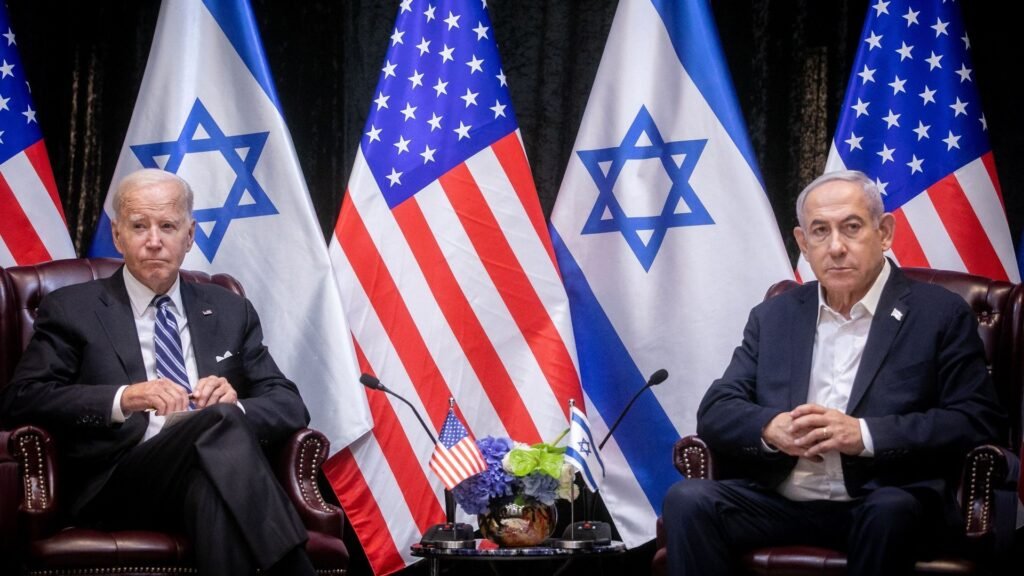The whole of Israel is marked with anti-Benjamin Netanyahu protests that he strained the country’s relations with the US, and escalated tensions in Gaza. Citizens took to the streets in March to create a turbulent time for the Israeli Prime Minister. A large number of people expressed deep dissatisfaction with his policies and the government’s handling of the Gaza conflict. The traditionally strong US-Israel relationship also faced challenges, with a public split between Netanyahu and President Biden over disagreements on addressing the Gaza conflict and Israel’s internal policies.
You Can Also Read: Famine Alert in Gaza Seeks World Help
Netanyahu’s approach contributed to increasing Israel’s international isolation, with high-profile figures expressing concerns, signaling an unusual rift with traditional allies. Efforts to negotiate a ceasefire in Gaza were complicated by additional demands from Hamas and the difficult situation on the ground, including humanitarian crises and military actions.
The combination of domestic unrest, deteriorating relations with a key ally, and an intensifying conflict in Gaza suggests a period of uncertainty and difficulty for Netanyahu’s leadership and Israel’s geopolitical position, raising questions about his political future.
Netanyahu’s Hardline Background
Netanyahu’s stance has often been characterized by a hardline approach to security and skepticism towards the peace process with Palestinians. His tenures as prime minister have been marked by tensions and conflict, despite occasional moves toward peace.
The Israeli Leader’s return to power in recent years has seen him lead a coalition government comprising right-wing parties, facing scrutiny over its handling of domestic and foreign policies. The coalition’s composition and his reliance on right-wing partners have raised concerns about the direction of Israeli policies, particularly regarding the Israeli-Palestinian conflict and judicial reforms.
His leadership has also impacted Israel’s relations with neighbors and the international community, with actions and positions of coalition members testing ties with allies and regional partners. Despite challenges, he has attempted to navigate these complexities while maintaining his political position.
Protests Rock Israel
March 2024 witnessed widespread protests across Israel, reflecting deep divisions and intense dissatisfaction among its citizens. In major cities like Tel Aviv and Jerusalem, diverse groups ranging from war veterans to reservists took to the streets, voicing demands for a deal to release hostages held by Hamas, early elections, and opposition to the government’s judicial overhaul plan. The scale of the nationwide protests was significant, with hundreds of thousands joining to express their discontent with the government’s policies.
Clashes between protesters, police, and Netanyahu supporters underlined the charged atmosphere across the country. The demands for Netanyahu’s resignation and the release of captives held in Gaza highlighted grievances against the government’s handling of the Gaza conflict and broader governance issues.
Biden Fallout
Divisions widened between U.S. President Joe Biden and Israeli Prime Minister Benjamin Netanyahu, primarily over Israel’s military actions in Gaza. The Biden administration signaled openness to engaging other Israeli figures like Benny Gantz, suggesting concerns about Netanyahu’s leadership.

On March 18th, their first call in over a month addressed hostage negotiations and the humanitarian crisis in Gaza. Biden emphasized Israel protecting civilians and facilitating aid delivery, following public criticism of Netanyahu’s handling of the conflict, especially potential Rafah ground operations and high civilian casualties.
Biden has voiced apprehensions that Netanyahu’s actions harm rather than benefit Israel, urging care to protect innocent lives. This reflects broader strains driven by differences over addressing Hamas and the civilian impact.
Netanyahu has indirectly rebuked Biden, defending Israel’s military strategy and arguing civilian casualties result from Hamas tactics, not Israeli actions. This indirect exchange reflects deeper tensions amid domestic and international criticism of Netanyahu’s policies and implications for U.S.-Israel ties.
Increasing International Isolation

Prime Minister Benjamin Netanyahu’s policies and actions drew growing international concerns. Many countries and organizations expressed unease over Israel’s military operations in Gaza, judicial overhaul plans, and broader policy directions under Netanyahu’s leadership.
The Biden administration signaled a cooling in U.S.-Israel relations, with President Biden publicly highlighting the need for Israel to better protect civilian lives and facilitate humanitarian aid in Gaza. The U.S. also engaged with other Israeli political figures, suggesting a look beyond Netanyahu for leadership.
Despite these tensions, core aspects of the U.S.-Israel relationship, such as military aid, remained intact. However, the public disagreements suggested a notable strain in relations.
International critique extended beyond the U.S., with other countries and global entities voicing concerns about Israel’s policies under Netanyahu and their implications for regional stability and peace prospects.
While Israel remained central on the global stage, its interactions with longstanding allies underwent a noticeable shift, highlighting the complexities of navigating diplomatic relations amid internal and external pressures under Netanyahu’s controversial leadership.
Future Grim for Netanyahu
March 2024’s events cast a dark shadow over Prime Minister Benjamin Netanyahu’s future. Widespread protests across Israel signal widespread discontent with his leadership and policies. The strained U.S.-Israel relations, especially between Netanyahu and President Biden, further complicates his political landscape. Biden’s criticism and U.S. outreach to other Israeli figures suggest a decrease in Netanyahu’s international standing.
The criticism at home and abroad reflects deep concerns over his handling of the Gaza conflict, judicial overhaul plans, and broader policies. These have strained ties with allies and raised doubts about Netanyahu’s ability to navigate Israel’s crises. Opinion polls indicate a potential shift in voter sentiment against him, despite his strong base. The combination of protests, isolation, and diplomatic strains poses major challenges to his tenure.
Conclusion
March 2024 was pivotal for Netanyahu and Israel. Protests, global criticism, and diplomatic rifts tested his leadership and Israel’s position. Unrest reflects societal divisions, with calls for Netanyahu’s exit across the country signaling demands for change.
Internationally, the U.S. rift, especially between Netanyahu and Biden, underscored challenges in maintaining traditional alliances. His Gaza and judicial policies fueled tensions with implications for Israel’s security, democracy, and global ties.
Netanyahu faces substantial hurdles ahead. His legacy and Israel’s path hang precariously. The coming months will prove crucial, potentially defining his controversial tenure’s outcome and shaping Israel’s trajectory as the world watches closely.


